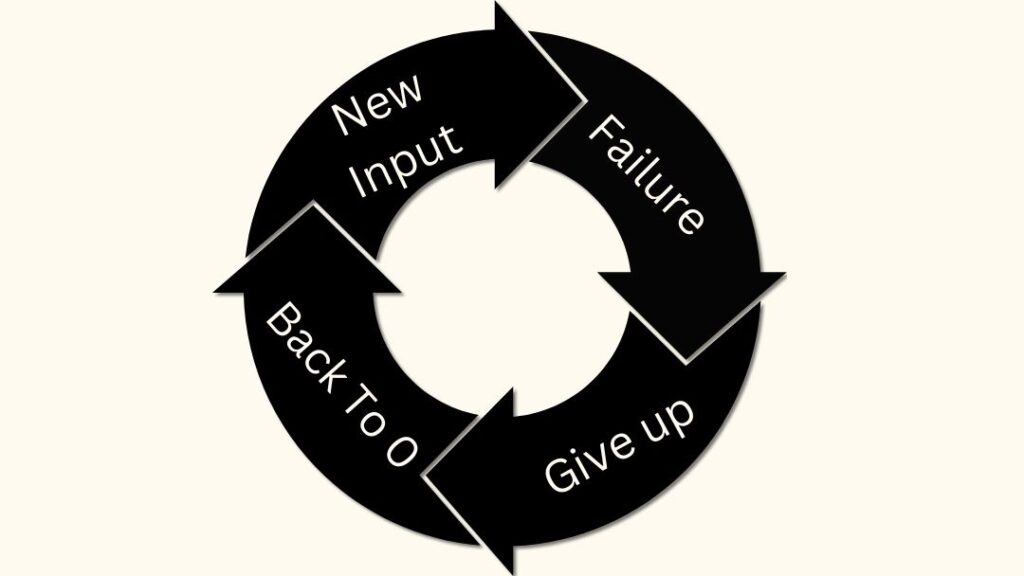“After our last session, I had trouble walking straight for 2 days, it felt like I re-lived the symptoms of my Concussion,” I told my therapists two weeks ago. Her answer?
“Great.”
And Barbara is right. This is great news. For my long-term recovery. As a great therapist, she understands an important mechanism:
If you want to break through a plateau, you need to be willing to get worse in the short term.
This applies not only to Traumatic Brain Injury patients but to anyone in the World. Also to chess improvers.
Giving Up When You Get Worse
The problem is that most people on this planet give up when things get worse. Or they aren’t ready to accept getting worse in the first place. So they get stuck.
Their life-cycle looks like this:

If you want to have a different life, you need to:
1) Be ready to see your performance drop when trying out new things
2) Stick to something new for a period of time (e.g. avoid giving up prematurely).
I failed to do Number 2 when trying to improve my Tennis serve. I have no technique, but somehow I manage to get the ball decently over the net. The problem is that without technique, I’m stuck at this mediocre serving level for my lifetime.
So a friend took the time to teach me the right way to serve and I tried it out.
I only made double faults for the first hour. So I went back to my old serve. “See, this works,” I thought. Now I’m stuck at the same level again…
The same might happen with my health and in Chess improvement.
How To Stick To It Long Enough
To avoid falling into that vicious cycle, I have two main tricks I use daily:
1) Expect things to get worse
2) Commit to something new for a period of time (usually 1-3 months)
When I started working with GM Iossif Dorfman, I had to throw out my old way of thinking about Chess. I was confused, needed more time for my decisions, and lost self-confidence. But luckily I didn’t give up.
I expected things to be hard and eventually the new way of thinking about chess helped me to reach the GM title only a little over a year after starting the work with Iossif.
First a dip, then a big jump.
To avoid feeling too frustrated, I didn’t plan too many tournaments in the first months of working with Iossif. Why play if I expect that I perform worse?
Overcome a Plateau in Chess
Here lies one of the biggest problems for modern-day chess improvers (you, my dear reader). Online Chess got much bigger and more important. Most chess improvers play at least once-a-week rated games, some even every day.
As we all care a little too much about our rating, it becomes increasingly harder to learn new things and accept to lose maybe even 50-100 points short term.
And if it happens, you might have the intuition that you are doing something wrong and go back to your old habits. This might bring the 50-100 points back, but avoid all possible improvements.
Here are some things you can do to allow yourself to learn new things and break through many plateaus in your chess journey:
- Keep your focus always on the long term. Do not identify with your rating.
- Play on both major online sites. On one site you only play if you feel great. If you go through big changes or feel a little below your normal strength, play for fun and learn on the other site. Do not care in the slightest about this rating.
- Commit to changes for 1-3 months. For example, if you learn a new opening, commit to playing it at least for 1 month before comparing results. It is normal that you make more mistakes initially because you have less experience in those positions.
- Use the “switch off” rating function on Lichess if that makes you feel better. Apply what you learned and then check your rating only after a month.
The answer to getting unstuck is being ready to get worse.
This process is supposed to be hard. Use this to your advantage. If you are ready to get worse short term and learn new things that help you grow, you will improve more than nearly everyone else.
I’m feeling much better right now and am looking forward to another therapy session that will likely make me feel worse. That’s part of the plan. What matters is being 100% healthy in the future.
What matters to you? Short-term failures or long-term success? It is in your hands!
Keep improving,
Noël
PS: This Article went out as a Newsletter to over 15,000 Chess fans. If you want to get the next one in your inbox, subscribe here for free.
Whenever you’re ready, here is how I can help you:
My Course, Next Level Training: Join 550+ motivated Chess improvers inside Next Level Training. This course will teach you everything you need to know about studying chess on your own. From solving chess tactics the right way to building an opening repertoire and analyzing your own games, everything is in here. You can check it out without any risks, as it has a 14-day money-back guarantee.